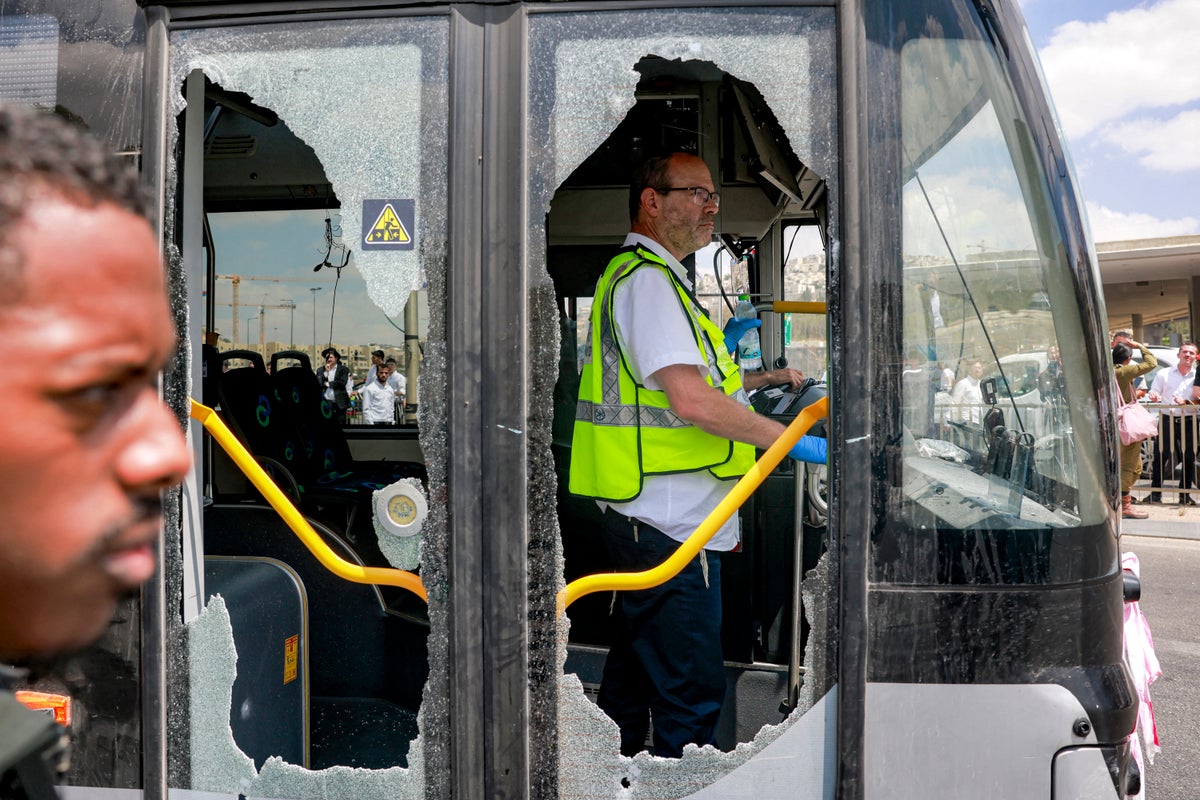Overweight and middle-aged, a taxi driver calmly opens the door for his passenger as bullets fly from a militant attack on a bus just down the road.
He doesn’t flinch when the window of the coach behind his right ear explodes with the impact of two rounds. He quietly escorts his passenger to safety – placing his body in the firing line.
Caught on dashcam during Monday’s assault on a civilian Israeli bus on the outskirts of Jerusalem – in which four people and two gunmen were killed – the taxi-driver’s calm under fire echoes the extraordinary stoicism of Gazans who have endured relentless targeting for many months.
That people on both sides have become so inured to ultraviolence, and dig so deep to survive and to do so with dignity, is an indictment of the extremists who are leading the conflict. But it is no surprise.
It is also no surprise that just as the Palestinian cause has galvanised world support and been inflamed by Israel’s atrocities and war crimes in Gaza, a group of Palestinians spray indiscriminate gunfire into a busload of civilians and undermine their own agenda.
There’s an old racist cliché often used by Israel and its supporters that the “Palestinians never miss an opportunity to miss an opportunity” in dealing with Israel.
The truth is that while Israel has concreted over the West Bank and international law by building settlements that its own ministers now proudly declare are intended to prevent the Palestinians ever having their own state, groups like Hamas have torpedoed every effort to allow a two-state solution. That is the creation of a Palestinian state next to an unmolested Israel.
Gaza and Israel are currently ruled, or governed, by two leaderships that believe that there can only be one state between the River Jordan and the sea. For both extremists, a two-state dispensation is off the cards.
Hamas, which continues to survive Israel’s assaults since October 7 2023, is reported to be considering a ceasefire offer which Israel has not endorsed. It praised the Palestinian “resistance fighters” who carried out the attack – but did not say that it was a Hamas operation.
In the past, Hamas has literally blown up optimistic diplomatic developments and moves that might have ushered in a Palestinian state because the “zionist entity” would have survived. During the second intifada in the early 2000s, you could time a suicide bombing to within a couple of hours of news of a potential deal filtering out of talks.
But Hamas wasn’t behind Monday’s shooting of the bus at the Ramot Junction.
The killings were just inside the occupied Palestinian territory, captured by Israel in 1967 and later illegally annexed into the state. Just like the land where the US embassy now stands in Jerusalem.
The attack on civilians in occupied territory does not serve even Hamas’ interests or strategy. There is no diplomatic advance to sabotage.
But there are plenty of armed groups outside the control of the traditional parties and militants on the West Bank.
One group, known as the Lions of Nablus, emerged long before the October 7 attacks on Israel and provoked a massive military response from Israel in the north of the Occupied West Bank.
Israel has since campaigned against alleged armed groups with what it calls “targeted killings” by aircraft as well as straightforward invasions of Palestinian towns and villages.
Jewish inhabitants of settlement colonies on the West Bank have attacked unarmed Palestinians with impunity.
In one notorious case, Yinon Levi shot and killed filmmaker Odeh Hathaleen in front of witnesses who filmed the killing – but he was released by an Israeli military court after a few days’ detention.
There are plenty of local reasons why Palestinians would pick up arms. And they are likely to do so with increasing frequency.
As an armed settler, Levi could be judged to be a military combatant and part of Israel’s ongoing occupation and therefore a legitimate target under international law.
A legal declaration by Australian judge Hilary Charlesworth at the International Court of Justice suggests Palestinians are “not precluded from using force in accordance with international law to resist the occupation”.
International law would require resistance fighters to be uniformed, carry their weapons openly, only target military personnel, and be part of a known organisation. They rarely, if ever, meet that definition.
Ironically, armed Hamas fighters in Gaza may meet the legal definition of legitimate resistance fighters (even though elsewhere the organisation uses the tactic of terror, with random attacks on civilians).
But the violence unleashed by Israel in its campaign against Hamas and its march of settlements across the West Bank is making it harder even for extremist groups to control their people.
Monday’s attack may have been entirely self-starting among young men too long humiliated, robbed of hope, and pumped full of extremist rhetoric.
Israel, meanwhile, has vowed a “hurricane of strikes” as part of its renewed offensive in Gaza.
“A mighty hurricane will hit the skies of Gaza City today, and the roofs of the terror towers will shake,” Israeli defence minister Israel Katz wrote on X (Twitter).
“This is a final warning to the murderers and rapists of Hamas in Gaza and in the luxury hotels abroad: Release the hostages and lay down your weapons – or Gaza will be destroyed, and you will be annihilated.”
About 20 hostages are believed to be alive after they were kidnapped by Palestinian militants in Israel in October 2023. Since then more than 67,000 people have been killed in Gaza – more than half were women and children.
That level of terror and what has just hit Jerusalem offers nothing to either side but the need to endure.

